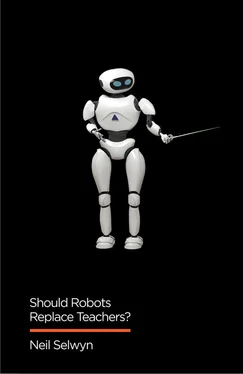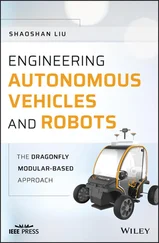1 Cover
2 Front Matter Should Robots Replace Teachers? AI and the Future of Education NEIL SELWYN polity
3 Preface Notes
4 1 AI, Robotics and the Automation of Teaching Robots and artificial intelligence Teachers and teaching AI and teaching – big hopes and complex issues AI and education – seeing the bigger picture The need to be critical Conclusions Notes
5 2 Physical Robots in the Classroom Robots in the classroom The potential and practicalities of classroom robots How it ‘feels’ to be taught by a non-human The ethics of robot teachers The politics of robot teachers Conclusions Notes
6 3 Intelligent Tutoring and Pedagogical Assistants The rise of the ‘intelligent tutor’ The first wave of pedagogical agents Current trends in pedagogical agents The potential and practicalities of pedagogical agents A reduced synthetic experience? Manipulating individual action The ethical dilemma of the robot teacher Conclusions Notes
7 4 ‘Behind-the-Scenes’ Technologies Digital automations of contemporary teaching The potential and practicalities of automated educational software Holding data to account The inequalities of individualization The labour politics of automated teaching Conclusions Notes
8 5 Revitalizing Teaching for the AI Age What computers can (and can’t) do in education Restating the case for human teachers Recognizing AI as a double-edged sword What next? AI as a chance to renegotiate education Conclusions Notes
9 Index
10 End User License Agreement
1 Cover
2 Table of Contents
3 Begin Reading
1 ii
2 iii
3 iv
4 vi
5 vii
6 viii
7 ix
8 x
9 xi
10 xii
11 xiii
12 1
13 2
14 3
15 4
16 5
17 6
18 7
19 8
20 9
21 10
22 11
23 12
24 13
25 14
26 15
27 16
28 17
29 18
30 19
31 20
32 21
33 22
34 23
35 24
36 25
37 26
38 27
39 28
40 29
41 30
42 31
43 32
44 33
45 34
46 35
47 36
48 37
49 38
50 39
51 40
52 41
53 42
54 43
55 44
56 45
57 46
58 47
59 48
60 49
61 50
62 51
63 52
64 53
65 54
66 55
67 56
68 57
69 58
70 59
71 60
72 61
73 62
74 63
75 64
76 65
77 66
78 67
79 68
80 69
81 70
82 71
83 72
84 73
85 74
86 75
87 76
88 77
89 78
90 79
91 80
92 81
93 82
94 83
95 84
96 85
97 86
98 87
99 88
100 89
101 90
102 91
103 92
104 93
105 94
106 95
107 96
108 97
109 98
110 99
111 100
112 101
113 102
114 103
115 104
116 105
117 106
118 107
119 108
120 109
121 110
122 111
123 112
124 113
125 114
126 115
127 116
128 117
129 118
130 119
131 120
132 121
133 122
134 123
135 124
136 125
137 126
138 127
139 128
140 129
141 130
142 131
143 132
144 144
145 145
146 146
Milton Mueller, Will the Internet Fragment?
Neil Selwyn, Is Technology Good for Education?
Neil Selwyn, Should Robots Replace Teachers?
Axel Bruns, Are Filter Bubbles Real?
Should Robots Replace Teachers?
AI and the Future of Education
NEIL SELWYN
polity
Copyright © Neil Selwyn 2019
The right of Neil Selwyn to be identified as Author of this Work has been asserted in accordance with the UK Copyright, Designs and Patents Act 1988.
First published in 2019 by Polity Press
Polity Press
65 Bridge Street
Cambridge CB2 1UR, UK
Polity Press
101 Station Landing
Suite 300
Medford, MA 02155, USA
All rights reserved. Except for the quotation of short passages for the purpose of criticism and review, no part of this publication may be reproduced, stored in a retrieval system or transmitted, in any form or by any means, electronic, mechanical, photocopying, recording or otherwise, without the prior permission of the publisher.
ISBN-13: 978-1-5095-2898-1
A catalogue record for this book is available from the British Library.
Library of Congress Cataloging-in-Publication Data
Names: Selwyn, Neil, author.
Title: Should robots replace teachers? : AI and the future of education / Neil Selwyn.
Description: Cambridge, UK : Medford, MA, USA : Polity Press, [2019] | Series: Digital futures | Includes bibliographical references and index.
Identifiers: LCCN 2019001774 (print) | LCCN 2019011944 (ebook) | ISBN 9781509528981 (Epub) | ISBN 9781509528950 | ISBN 9781509528967 (pb)
Subjects: LCSH: Artificial intelligence--Educational applications. | Intelligent tutoring systems.
Classification: LCC LB1028.43 (ebook) | LCC LB1028.43 .S45 2019 (print) | DDC 371.33--dc23
LC record available at https://lccn.loc.gov/2019001774
The publisher has used its best endeavours to ensure that the URLs for external websites referred to in this book are correct and active at the time of going to press. However, the publisher has no responsibility for the websites and can make no guarantee that a site will remain live or that the content is or will remain appropriate.
Every effort has been made to trace all copyright holders, but if any have been overlooked the publisher will be pleased to include any necessary credits in any subsequent reprint or edition.
For further information on Polity, visit our website: politybooks.com
The digital automation of teaching is set to be one of the defining educational challenges of the next twenty years. While the deployment of human-looking robots in classrooms remains more of a publicity stunt than a serious educational trend, many other forms of digital automation are being implemented across schools and universities around the world. Teachers are not being replaced by physical robots per se , but are increasingly surrounded by software, apps, platforms and other forms of artificial intelligence designed to carry out pedagogical tasks.
Most teachers remain confident that they are unlikely to be pushed aside by ‘intelligent systems’ any time soon. Nevertheless, teachers at all levels of education already face the prospect of working alongside these technologies. Thus, it is certainly worth exploring the extent to which human teachers might be displaced by machines in the near future. What aspects of teaching might it soon no longer make sense for humans to perform? Can automated systems free teachers up to work in different and more rewarding ways? Alternatively, will the humans who remain employed in education settings be compelled to work in an increasingly machine-like manner?
These are no longer frivolous or far-fetched questions. Powerful technologies are now being designed to autonomously support various types of learning – from infants picking up their first words through to physicians honing their surgical skills. A billion-dollar ‘EdTech’ market continues to grow as investors, developers and self-styled ‘edu-preneurs’ strive to overturn traditional modes of education, while also making tidy profits. The matter of how people learn (and, it follows, how people are supported in their learning) continues to be an area that is widely considered ready for innovation, reform and ‘disruption’. The long-held professional status of school teachers and university lecturers is definitely under threat.
Читать дальше











